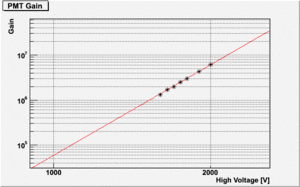Difference between revisions of "Test Stand at FSU"
From GlueXWiki
| Line 54: | Line 54: | ||
1500 5.33e5 | 1500 5.33e5 | ||
</pre> | </pre> | ||
| + | <br> | ||
| + | The data fit well to a linear function in a log-log plot as illustrated below for PMT WA0009<br> | ||
| + | [[Image:gain_PMT_VA0009.gif|300px]] | ||
Revision as of 18:29, 7 December 2011
Cosmic ray test stand at FSU
- Sketch of the electronics setup and trigger circuit.
- The Test Stand
- 2 Trigger paddle 3/4" thick, 6cm wide and 40cm long with PMTs on both ends are located above and below the TOF paddle which is 252cm long 6cm wide nad 1" thick. Also the TOF paddle is read out on both ends with PMTs.
- The 50 Ohm terminations at the PMTs were removed and linear FAN IN/OUT are introduced. The signals from the PMTs are directly connected to individual linear FAN IN/OUT channels. Each of these channels has its DC offset adjusted to be zero or slightly negative. One output of each linear FAN IN/OUT is connected to a JLAB VME discriminator and a second output is connected over delay cables to a CANE VME charge integrating ADC. The 4 PMTs from the trigger paddles from a 4-fold coincidence to generate a trigger signal. This trigger signal is set into coincidence with a DAQ latch level and the inverted BUSY signal from the TI.
- Picture of the detectors in the test stand:
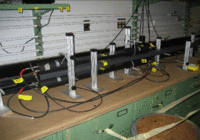
- The HV for the two TOF PMTs are set to provide average signal amplitudes of about 300mV with the trigger paddles located at the center of the TOP paddle. The HV of the right PMT is 1400V and 1600V for the left PMT. The gain of the right PMT at 1750 was measured to be 4.6e6 while the left PMT gain a 1750V is found to be 1.3e6. Here a screen shot of the scope and similarly if the trigger paddles are moved 17" from the right PMT. At this location the signal of the left PMT reduced to about 200mV while the signal from the right PMT increased to about 600mV(yellow):
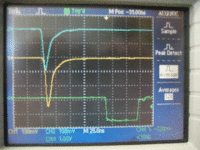
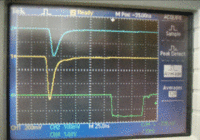
- Time difference histograms for the trigger paddles and for the TOF paddle:
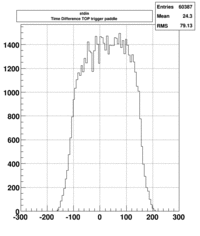
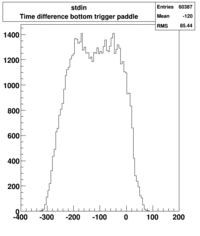
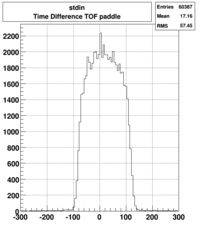
The horizontal axis is in TDC channels with 0.025ns/ch. The width of the timing distribution of the trigger paddles is substantially larger than for the TOF paddle. The TOF paddle effective speed of light is about 16cm/ps. - ADC spectra for left and right TOF paddle. HV-left=1600V(Gain=9.02e5), HV-right=1400V(Gain=9.36e5)
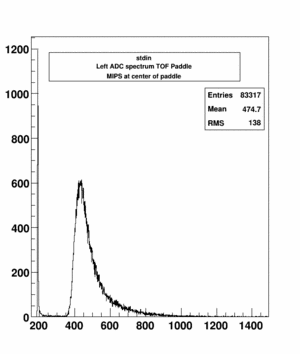
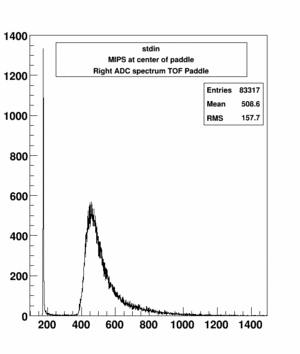
The gain has been evaluated from a fit the gain measurements outlined below.
PMT Gains
The PMT gains of several Hamamatsu tubes have been determined using a 10-fold fast amplifier in the case of the 10-stage tubes and a series of 2 10-fold amplifiers in the case of an 8-stage tube. The LED used in this test generates UV light. The pulse sent to the LED is about 50ns long while the amplitude is adjusted to moderate the light output such that single photo electrons are clearly identified in the ADC spectrum.
PMT assemply H10534, WA0009 (not in use)
HV Gain
2000 6.12e6
1900 4.30e6
1800 2.98e6
1750 2.50e6
1700 2.00e6
1650 1.69e6
1600 1.31e6
PMT assemply H10534, ZM6059 (right TOF paddle)
HV Gain
1850 6.57e6
1750 4.61e6
1650 2.94e6
PMT assemply H10534, WA0010 (BR trigger paddle)
HV Gain
1850 4.28e6
1750 2.94e6
1650 2.02e6
PMT assemply H10534, ??? (left TOF Paddle)
HV Gain
1850 1.62e6
1750 1.30e6
PMT assemply Hxxxxx, 8-stage tube
HV Gain
1600 8.05e5
1500 5.33e5
The data fit well to a linear function in a log-log plot as illustrated below for PMT WA0009
